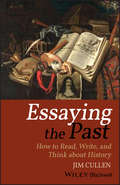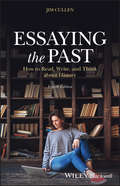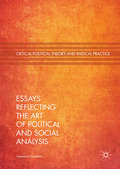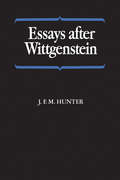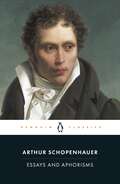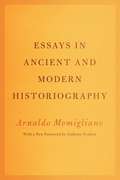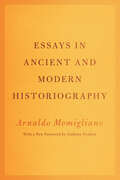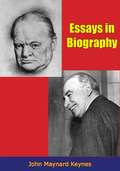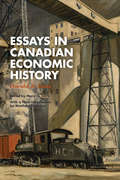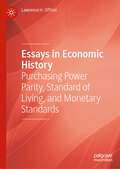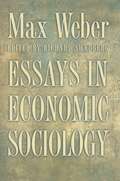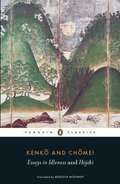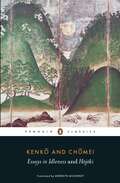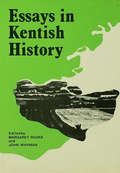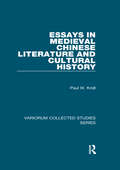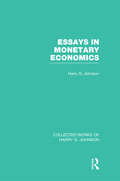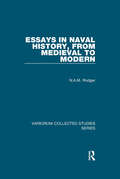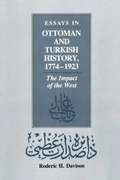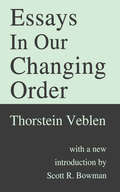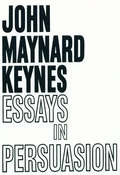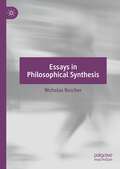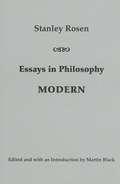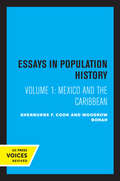- Table View
- List View
Essaying the Past: How to Read, Write, and Think about History
by Jim CullenPart research manual, part study guide, and part introduction to the study of history, Essaying the Past guides the reader through the nuts and bolts of producing good historical prose, offering key strategies and useful tips. Includes expert advice on writing about history, conducting good research, and learning how to think analytically Covers important topics such as framing questions, developing a strong introduction and topic sentences, choosing good evidence, and the crucial role of revision An annotated case study takes the reader through one student’s process of writing an essay and illustrates how strategies discussed in the book can be successfully implemented Six appendices cover the major issues facing students today, such as the dangers of plagiarism and the role of the internet
Essaying the Past: How to Read, Write, and Think about History
by Jim CullenLearn to craft the perfect historical research paper with this approachable and practical guide Essaying the Past: How to Read, Write, and Think about History, 4th Edition continues the tradition of excellence established by the previous editions. Equal parts research manual, study guide, and introduction to the study of history, this book teaches readers how to write excellent historical prose with approachable strategies and actionable tips. Noted teacher and writer Jim Cullen has created an invaluable resource for novices and experts in the field of historical study, offering practical insights into determining how questions should be framed, developing strong introduction and topic sentences, choosing evidence, and properly revising your work. Essaying the Past includes six appendices covering the major issues facing students today, including the pitfalls and temptations of plagiarism and the role of the internet. It also contains an annotated case study outlining one student’s process of writing an essay and demonstrating the application of the concepts contained within the book. Essaying the Past covers topics including: How to think and read about history and ask the right questions about what you’re reading The three components of crafting a compelling argument How to deal with counterarguments and counterevidence How to properly construct a bibliography and insert footnotes How to assess the credibility of online resources Perfect for students taking surveys or courses in methods or historiography, Essaying the Past also belongs on the bookshelf of anyone with even a passing interest in studying, researching, consuming, or writing about history.
Essays Reflecting the Art of Political and Social Analysis (Critical Political Theory and Radical Practice)
by Lawrence DavidsonIn 2011, Lawrence Davidson founded his website, tothepointanalyses.com, as a home for his brief essays on contemporary issues touching on US domestic and foreign policy. Over the last few years, Davidson's analytic reflections on contemporary politics have garnered over six million views. Now, for the first time, these essays are collected together to form a coherent, punchy look at American Politics in 2018. Contextualized by a new prologue and new conclusion, as well as updated with new material throughout, these essays provide a cogent demonstration of the power of analytical thinking to create clear and understandable descriptions of issues that impact us all, but are most often obfuscated by propaganda, lying by omission, or other forms of distortion. For those who encounter this work, it is hoped that they will come away with a clearer, if not happier, idea of what sort of world we are all living in.
Essays after Wittgenstein
by J.F.M. HunterWritten within the tradition of Wittgenstein's work, these eight original essays in philosophical psychology are either by-products of efforts to understand Wittgenstein's later writings or applications of techniques and approaches derived from Wittgenstein to problems about which he did not say a great deal. In much of his later writings, Wittgenstein was not so much trying to explain his own views as to tease, annoy, and confuse the reader into working our for himself solutions to some philosophical problems. Professor Hunter, goaded and guided by Wittgenstein, here presents in clear and plain prose the views that he has worked out on a number of different questions. Although the essays are not exegetical in form, they will be found by students of the great philosopher to contain a large number of novel suggestions as to how Wittgenstein might be interpreted; philosophers, psychologists, linguists, and mathematicians are offered an unconventional, interesting, and richly argued approach to some of the main problems in philosophical psychology. The essays treat Meaning, Telling, Pain, Logical Compulsion, Identity, Imagining, Dreaming, and Talking. One eminent scholar has predicted that this volume may reverse the present tendency of philosophers to follow the lead of Noam Chomsky in the philosophy of language.
Essays and Aphorisms
by Arthur SchopenhauerOne of the greatest philosophers of the nineteenth century, Schopenhauer (1788-1860) believed that human action is determined not by reason but by 'will' - the blind and irrational desire for physical existence. This selection of his writings on religion, ethics, politics, women, suicide, books and many other themes is taken from Schopenhauer's last work, Parerga and Paralipomena, which he published in 1851. These pieces depict humanity as locked in a struggle beyond good and evil, and each individual absolutely free within a Godless world, in which art, morality and self-awareness are our only salvation. This innovative - and pessimistic - view has proved powerfully influential upon philosophy and art, directly affecting the work of Nietzsche, Wittgenstein and Wagner among others.
Essays in Ancient and Modern Historiography
by Arnaldo MomiglianoArnaldo Momigliano was one of the foremost classical historiographers of the twentieth century. This collection of twenty-one carefully selected essays is remarkable both in the depth of its scholarship and the breadth of its subjects. Moving with ease across the centuries, Momigliano supplements powerful readings of writers in the Greek, Jewish, and Roman traditions, such as Tacitus and Polybius, with writings that focus on later historians, such as Vico and Croce. Charmingly written and concise, these pieces range from review essays reprinted from the New York Review of Books to treatises on the nature of historical scholarship. Essays in Ancient and Modern Historiography is a brilliant reminder of Momigliano's profound knowledge of classical civilization and his gift for deftly handling prose. With a new Foreword by Anthony Grafton, this volume is essential reading for any student of classics or historiography.
Essays in Ancient and Modern Historiography
by Arnaldo MomiglianoArnaldo Momigliano was one of the foremost classical historiographers of the twentieth century. This collection of twenty-one carefully selected essays is remarkable both in the depth of its scholarship and the breadth of its subjects. Moving with ease across the centuries, Momigliano supplements powerful readings of writers in the Greek, Jewish, and Roman traditions, such as Tacitus and Polybius, with writings that focus on later historians, such as Vico and Croce. Charmingly written and concise, these pieces range from review essays reprinted from the New York Review of Books to treatises on the nature of historical scholarship. Essays in Ancient and Modern Historiography is a brilliant reminder of Momigliano’s profound knowledge of classical civilization and his gift for deftly handling prose. With a new Foreword by Anthony Grafton, this volume is essential reading for any student of classics or historiography.
Essays in Biography
by John Maynard KeynesOf the fifteen famous scientists, economists and statesmen sketched in this collection of essays, which was first published in 1933, John Maynard Keynes was directly acquainted with all but three. The unique quality of immediacy in these biographical fragments contributes immensely to our more intimate appreciation of the historical significance of these men.This volume is made up of two parts:The first part, titled Sketches of Politicians, includes chapters on Lloyd George, Bonar Law, Lord Oxford and Sir Winston Churchill.The greater portion of the second part, Lives of Economists, is taken up with the lives of Robert Malthun, Alfred Marshall and F. Y. Edgeworth.All are literature, and the reader needn’t be an economist or a specialist to enjoy the excellent flavor of Keynes’ style of writing.
Essays in Canadian Economic History
by Matthew Evenden Harold Innis Mary Q. InnisHarold A. Innis helped to found the field of Canadian economic history. He is best known for the "staples thesis" which dominated the discourse of Canadian economic history for decades. This volume collects Innis’ published and unpublished essays on economic history, from 1929 to 1952, thereby charting the development of the arguments and ideas found in his books The Fur Trade in Canada and The Cod Fisheries. These essays capture Innis’ ever evolving views on the practices and uses of economic history as well as Canadian economic history. The new introduction written by prominent historian Matthew Evenden provides a fresh take on Innis life’s work and situates the essays in the context of his scholarship as well as recent studies on Canadian economic history. This volume offers invaluable insight into one of Canada’s most original thinkers and his interpretation of our nation’s history.
Essays in Economic History: Purchasing Power Parity, Standard of Living, and Monetary Standards
by Lawrence H. OfficerThis book is the culmination of and a collection of distinguished scholar Lawrence Officer’s principal research over 50 years of scholarly activity. The collection consists primarily of three topics on which the author has spent the major part of his research: purchasing power parity, standard of living, and monetary standards. There is also a unique chapter on economics and economic history in science fiction. This volume is ideal for academics, graduate and undergraduate students, and practitioners.
Essays in Economic Sociology
by Max WeberThe writings of Max Weber (1864-1920) contain one of the most fascinating and sophisticated attempts ever made to create an economic sociology. Economic sociologist and Weber scholar Richard Swedberg has selected the most important of Weber's enormous body of writings on the topic, making these available for the first time in a single volume. The central themes around which the anthology is organized are modern capitalism and its relationships to politics, to law, and to culture and religion; a special section is devoted to theoretical aspects of economic sociology. Swedberg provides a valuable introduction illuminating biographical and intellectual dimensions of Weber's work in economic sociology, as well as a glossary defining key concepts in Weber's work in the field and a bibliographical guide to this corpus. Weber's substantive views on economic sociology are represented in this volume through crucial excerpts from works such as his General Economic History and The Protestant Ethic and the Spirit of Capitalism, but the reader can follow his attempt to construct a conceptual foundation for economic sociology in Economy and Society as well. Also included is Weber's celebrated inaugural lecture, "The Freiburg Address," along with a number of central but hitherto inaccessible writings. Though written nearly a century ago, Weber's work has the quality of a true classic, and the reader will find many ideas in his writings on economic topics that remain applicable in today's world. These include Weber's discussion of what is now called social capital, his analysis of the institutions needed for a well-functioning capitalist economy, and his more general attempt to introduce social structure into economic analysis. As this volume demonstrates, what basically motivated Weber to work with economic sociology was a realization shared by many economists and sociologists today: that the analysis of economic phenomena must include an understanding of the social dimension. Guided by volume editor Swedberg, the reader of this anthology discovers the significance and the enduring relevance of Weber's contribution to economic sociology.
Essays in Honour of Michael Bliss
by Alison Li Shelley Mckellar E. A. HeamanA leading public intellectual, Michael Bliss has written prolifically for academic and popular audiences and taught at the University of Toronto from 1968 to 2006. Among his publications are a comprehensive history of the discovery of insulin, and major biographies of Frederick Banting, William Osler, and Harvey Cushing. The essays in this volume, each written by former doctoral students of Bliss, with a foreword by John Fraser and Elizabeth McCallum, do honour to his influence, and, at the same time, reflect upon the writing of history in Canada at the end of the twentieth century.The opening essays discuss Bliss's career, his impact on the study of history, and his academic record. Bliss himself contributes an autobiographical essay that strengthens our understanding of the business of scholarship, teaching, and writing. In the second section, the contributors interrogate public mythmaking in the relationship between politics and business in eighteenth-, nineteenth-, and twentieth-century Canada. Further sections investigate the relationship between fatherhood, religion, and historiography, as well as topics in health and public policy. A final section on 'Medical Science and Practice' deals with subjects ranging from early endocrinology, lobotomy, the mechanical heart, and medical biography as a genre. Going beyond a collection of dedicatory essays, this volume explores the wider subject of writing social and medical history in Canada in the late twentieth century.
Essays in Idleness and Hojoki
by Meredith Mckinney Kamo No Chomei Yoshida KenkoThese two works on life's fleeting pleasures are by Buddhist monks from medieval Japan, but each shows a different world-view. In the short memoir Hôjôki, Chômei recounts his decision to withdraw from worldly affairs and live as a hermit in a tiny hut in the mountains, contemplating the impermanence of human existence. Kenko, however, displays a fascination with more earthy matters in his collection of anecdotes, advice and observations. From ribald stories of drunken monks to aching nostalgia for the fading traditions of the Japanese court, Essays in Idleness is a constantly surprising work that ranges across the spectrum of human experience. Meredith McKinney's excellent new translation also includes notes and an introduction exploring the spiritual and historical background of the works. Chômei was born into a family of Shinto priests in around 1155, at at time when the stable world of the court was rapidly breaking up. He became an important though minor poet of his day, and at the age of fifty, withdrew from the world to become a tonsured monk. He died in around 1216. Kenkô was born around 1283 in Kyoto. He probably became a monk in his late twenties, and was also noted as a calligrapher. Today he is remembered for his wise and witty aphorisms, 'Essays in Idleness'.
Essays in Idleness: and Hojoki
by none Kenko Kamo no ChomeiThese two works on life's fleeting pleasures are by Buddhist monks from medieval Japan, but each shows a different world-view. In the short memoir Hôjôki, Chômei recounts his decision to withdraw from worldly affairs and live as a hermit in a tiny hut in the mountains, contemplating the impermanence of human existence. Kenko, however, displays a fascination with more earthy matters in his collection of anecdotes, advice and observations. From ribald stories of drunken monks to aching nostalgia for the fading traditions of the Japanese court, Essays in Idleness is a constantly surprising work that ranges across the spectrum of human experience. Meredith McKinney's excellent new translation also includes notes and an introduction exploring the spiritual and historical background of the works.Chômei was born into a family of Shinto priests in around 1155, at at time when the stable world of the court was rapidly breaking up. He became an important though minor poet of his day, and at the age of fifty, withdrew from the world to become a tonsured monk. He died in around 1216.Kenkô was born around 1283 in Kyoto. He probably became a monk in his late twenties, and was also noted as a calligrapher. Today he is remembered for his wise and witty aphorisms, 'Essays in Idleness'.Meredith McKinney, who has also translated Sei Shonagon's The Pillow Book for Penguin Classics, is a translator of both contemporary and classical Japanese literature. She lived in Japan for twenty years and is currently a visitng fellow at the Australian National University in Canberra.'[Essays in Idleness is] a most delightful book, and one that has served as a model of Japanese style and taste since the 17th century. These cameo-like vignettes reflect the importance of the little, fleeting futile things, and each essay is Kenko himself' Asian Student
Essays in Kentish History Cb: Essays Kentish History
by MARGARET ROAKE AND JOHN WHYMANFirst published in 1976. Routledge is an imprint of Taylor & Francis, an informa company.
Essays in Medieval Chinese Literature and Cultural History (Variorum Collected Studies #929)
by Paul W. KrollThis is one of a pair of volumes by Paul Kroll (the companion volume deals with medieval Taoism and the poetry of Li Po). Collecting eleven essays by this leading scholar of Chinese poetry, the volume presents a selection of studies devoted to the medieval period, centering especially on the T'ang dynasty. It opens with the author's famous articles on the dancing horses of T'ang, on the emperor Hsüan Tsung's abandonment of his capital and forced execution of his prized consort, and on poems relating to the holy mountain T'ai Shan (with special attention to Li Po). Following these are detailed examinations of landscape and mountain imagery in the poetry of the "High T'ang" period in the mid-8th century, and of an extraordinary attempt made in the mid-9th-century to recall in verse and anecdote the great days of the High T'ang. The second section of the book includes two articles on birds (notably the kingfisher and the egret) in medieval poetry, and four of Kroll's influential studies focusing on the verse-form known as the fu or "rhapsody," especially drawing from the 3rd-century poet Ts'ao Chih and the 7th-century poet Lu Chao-lin.
Essays in Monetary Economics: Essays In Monetary Economics (Collected Works of Harry G. Johnson)
by Harry G. JohnsonReprinting the second edition (which included a new introduction explaining developments which had emerged since first publication) this book discusses explorations in the fundamental theory of a monetary economy, a theoretical critique of the ‘Phillips Curve’ approach to the theory of inflation and the theory of the term structure of interest rates in terms of the theory of forward markets pioneered by David Meiselman.
Essays in Naval History, from Medieval to Modern (Variorum Collected Studies #930)
by N.A.M. RodgerThe articles collected here (two appearing for the first time in English) cover a number of topics central to naval history and illustrate the author's contention that this is not only, or even chiefly, a distinct area of special study, but rather a central theme running through the history of England, and of the whole British Isles. Though the subjects and the styles vary a good deal, the studies are linked by a common approach and some common ideas. Hence many examine ways in which naval history has formed a key element in such subjects as intellectual, religious, administrative or medical history and explored the nature and meaning of sea power as a theme. At the same time naval history is a technical subject, which demands a willingness to understand warships - the most complex artefacts - and the structure of large and complex organisations. Detailed evidence about ships and weapons can build large conclusions, for example about late Anglo-Saxon government and military organisation, or about the nature of warfare at sea in the Renaissance era. While mostly written from the British point of view, several essays explicitly survey naval developments over a range of countries, and even the most narrowly focused are at least implicitly aware of the wider world of war at sea.
Essays in Ottoman and Turkish History, 1774-1923: The Impact of the West
by Roderic H. DavisonThe effect of Western influence on the later Ottoman Empire and on the development of the modern Turkish nation-state links these twelve essays by a prominent American scholar. Roderic Davison draws from his extensive knowledge of Western diplomatic history and Turkish history to describe a period in which the actions of the Great Powers, incipient and rising nationalisms, and Westernizing reforms shaped the destiny of the Ottoman Empire and the creation of the new Turkish Republic. Eleven of the essays were previously published in widely scattered journals and multi-authored volumes. The first of these provides a general survey of Turkish and Ottoman history, from early Turkish times to the end of the Empire. The following essays continue chronologically from 1774, detailing some of the changes in the nineteenth-century Empire. Several themes recur. One is the impact of Western ideas and institutions and the resistance to that influence by some elements in the Empire. Another concerns the diplomatic pressure exerted by the Great Powers of Europe on the Empire, which amounted at times to direct intervention in Ottoman domestic affairs. Taken together, the essays portray a confluence of civilizations as well as a clash of cultures. Professor Davison has written an interpretive introduction that sets out the historical trends running throughout the book. In addition, he includes a previously unpublished article on the advent of the electric telegraph in the Ottoman Empire to show how the adoption of a Western technological advance could affect many areas of life. Of particular interest to students of Ottoman and Middle East history, these essays will also be valuable for everyone concerned with modernization in developing nations. Davison's interpretations and keen methodological sense also shed new light on several aspects of European diplomatic history.
Essays in Our Changing Order: A Posthumous Collection Of Papers From Periodicals (Reprints Of Economic Classics Ser.)
by Thorstein VeblenEssays in Our Changing Order is the ninth volume in the collected works of America's pre-eminent social scientist. Each volume has a new opening essay, in this case, a comprehensive review of Veblen's works by Scott Bowman that stands by itself as a premier statement. Using an innovative framework, Bowman sees Veblen as concerned with three unifying themes: the dynamic interrelationships between instinct, habits of thought, environment, and social change in human evolution; the essential contradiction between business and industry sustained by the instinctual dominance of pecuniary exploit over workmanlike efficiency; and the role of ideological and animistic thinking in human affairs.This volume of Veblen's most important studies, published posthumously in 1936, illustrates and embellishes the themes Bowman outlines in a variety of ways, and is remarkable for its contemporanity and literary freshness. Veblen's editor, Leon Ardzrooni, divides the work into three major segments: essays on economics, including the history of the field; miscellaneous papers, which nearly all come to rest on matters of religion and philosophy; and what Ardzrooni calls war essays, which again reveal a very worldly and wise observer of current events and critic of national policies. What is so astonishing is the timeliness of these seemingly time bound concerns: whether dealing with the condition of women, the intellectual contributions of Jews, farm labor and unions, or the meaning of the Bolshevik Revolution, Veblen confronts us with insights into still-unfinished business.
Essays in Persuasion
by John Maynard Keynes<P> The essays in this volume show Keynes's attempts to influence the course of events by public persuasion over the period of 1919-40. <P> In the light of subsequent history, Essays in Persuasion is a remarkably prophetic volume covering a wide range of issues in political economy. In articles on the Versailles Treaty. John Maynard Keynes foresaw all too clearly that excessive Allied demands for reparations and indemnities would lead to the economic collapse of Germany. In Keynes's essays on inflation and deflation, the reader can find ideas that were to become the foundations of his most renowned treatise, The General Theory of Employment, Interest and Money (1936). <P> With startling accuracy Keynes forecast the economic fluctuations that were to beset the economies of Europe and the United States and even proposed measures which, if heeded at the time, might have warded off an era of world-wide depression. His views on Soviet Russia, on the decline of laissez-faire, and the possibilities of economic growth are as relevant today as when Keynes originally set them forth.
Essays in Philosophical Synthesis
by Nicholas RescherThis book presents a series of coordinated studies that explain and illustrate how philosophy must be developed systematically with its problems and topics bound together by links of reciprocal interconnection.The book consists of two parts: The first part consists of a series of case studies which illustrate how philosophical issues do not remain in neatly separated compartments but reach out in interrelationship with one another. The second part analyzes the principle resources of philosophical methodology and shows in detail how and why they can only be implemented in a systemically interrelated manner. Overall, the book demonstrates and illustrates the systemic and holistic nature of philosophical inquiry.
Essays in Philosophy: Modern
by Stanley RosenThis collection testifies to the remarkable range of Stanley Rosen's learning and reflection in the history of philosophy, both ancient and modern. The publication of these essays, with all their speculative depth and richness, is truly a great philosophical benefit. It will throw new light on Rosen's thinking on many topics in metaphysics and political philosophy and on his readings of Plato, Kant, Hegel, Nietzsche, Heidegger, Kojève, Strauss, and other figures.
Essays in Population History, Volume One: Mexico and the Caribbean
by Woodrow Borah Sherburne F. CookThis title is part of UC Press's Voices Revived program, which commemorates University of California Press’s mission to seek out and cultivate the brightest minds and give them voice, reach, and impact. Drawing on a backlist dating to 1893, Voices Revived makes high-quality, peer-reviewed scholarship accessible once again using print-on-demand technology. This title was originally published in 1971.
